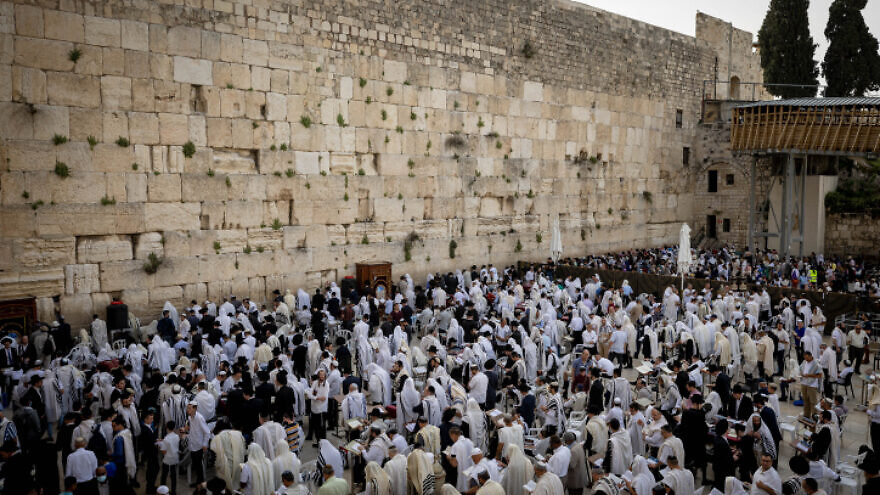Israeli security forces got what they were seeking: quiet. And, to some extent, Arab rioters got what they wanted: a depressed turnout.
With Jerusalem on edge and the threat of violence palpable, Monday morning’s Birkat Kohanim prayer service at the Western Wall (Kotel) and activities on the overlooking Temple Mount went off largely without a hitch.
“This is our first Yom Tov since COVID, and it was an incredible feeling to get back to the Kotel after two years. Our hearts were broken that we couldn’t be here,” Shayndi Miller of Brooklyn, N.Y., told JNS. Miller and her family are visiting Israel for the holiday period.
But attendance at the semi-annual Birkat Kohanim, or priestly blessing, which generally draws tens of thousands of Jewish worshippers to the Western Wall and surrounding plaza, was noticeably slim. Attendees numbered in the low thousands, according to most estimates.
This year the event, which is held each year during the intermediate days of the Passover and Sukkot festivals, was split into two sessions in order to reduce crowding—a precaution made in light of the accidental deaths of 45 people last year at Mount Meron in northern Israel in a stampede at an overcrowded religious event. However, most analysts believe that the security situation is the sole reason that many shied away from attending on Monday, even as around 2,500 officers from the Israel Police secured the area around the time of the prayers.
Arab rioters standing atop the Temple Mount threw stones at Western Wall worshippers down below on Friday as part of a violent day that saw the Al-Aqsa mosque turned into a weapons cache. Israeli security forces arrested hundreds of Arabs who threw rocks and fireworks from inside the mosque. Tens of thousands later attended peaceful Ramadan prayers at the mosque.
Additional attacks on Jews—both on foot and on public transportation—in the Old City over the weekend led to a sense of unease for many.
“We’re aware of the things that have been happening here, but it wasn’t going to stop us from coming. We have every confidence that the Israel Defense Forces and the police will do what they need to do. This is our first time back in Israel since the pandemic started, and we couldn’t miss this opportunity,” said Miller.
The ceremony, which sees male descendants of the Kohanim priests gather to bestow a benediction, involves the raising of hands to perform the blessing with those conducting it wrapped in prayer shawls. Several of Monday’s attendees covered themselves with Ukrainian flags.
‘Free rein’ to continue operations to maintain security
Meanwhile, a few hundred Jews ascended to the Temple Mount during the allotted morning hours. Some were verbally harassed by Arabs, and police reportedly rushed some of the Jewish pilgrims through their time there, but there were no reports of physical violence. Some Arabs attempted to place heavy rocks and other obstacles on the mount in order to prevent Jews from visiting. On Sunday, Israeli police entered the Temple Mount complex as hundreds of Palestinians allegedly sought to block Jewish visitors from visiting the site. Non-Muslims can only visit the Temple Mount during certain hours but are barred by Israeli law from praying.
During Monday’s ceremony, both Israeli Police Commissioner Kobi Shabtai and Jerusalem District Police Commander Doron Turgeman made their way through the Western Wall Plaza. Several attendees shouted their disapproval with Shabtai’s handling of recent events, and he was surrounded by police and security as he made his way above the plaza. Turgeman said on Sunday that police had no specific intelligence about planned terrorist attacks in Jerusalem but were operating under the assumption that attacks were being plotted, and that police would prepare accordingly.
Israeli Prime Minister Naftali Bennett said on Sunday that Israeli forces have “free rein” to continue operations to maintain security while stressing that officials were working to restore calm.
Several arrests were made on Monday in the case of an Israeli bus that was ambushed and stoned in Jerusalem on Sunday, leading to more than a dozen people injured, and an ambush of a group of Jews walking through the Old City. At least 10 buses were stoned in the area around the Old City on Sunday.
Despite, or perhaps because of, Monday’s relative quiet, Palestinians in the Gaza Strip fired a rocket into Israeli territory late Monday. It was intercepted over southern Israel by the Iron Dome missile-defense system. Israeli forces retaliated by striking a weapons depot belonging to the terrorist Hamas group that controls Gaza. Both Israel and Hamas reportedly exchanged messages through intermediaries that neither side was interested in an escalation. Hamas reportedly denied that its militants had fired the rocket.
Hamas called for an escalation at the Temple Mount last week after a Jewish Temple Mount activist group called for Passover sacrifices there. Israeli government officials have repeatedly and vigorously ruled out that possibility and have prevented such ceremonies from taking place in prior years.
Hamas and other Gaza-based terror groups have consistently provoked tensions at the Temple Mount, using the Israeli security response to escalate the situation and bring about international condemnation against Israel. Police actions to stamp out riots on the Temple Mount last year were cited by Hamas as they and other terrorist groups launched more than 4,000 rockets from Gaza at Israeli civilian populations for 11 days in May.
The U.N. Security Council is set to meet on Tuesday in closed consultations to discuss Temple Mount tensions. Neither Israel nor the Palestinian Authority will be allowed to attend.


























